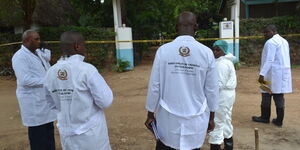The Kenya National Bureau of Statistics (KNBS) on Friday, January 31, differed with a recent court ruling cancelling the 2019 census results in Wajir, Mandera, and Garissa counties and the directive to conduct a fresh census in one year, terming it a ‘herculean’ task.
While speaking to Citizen TV, KNBS Director General Macdonald George Obudho stated that conducting the census takes four years to plan besides the massive amount of resources required to conduct the census. According to him, this makes the practicality of heeding the order nearly impossible.
The bureau’s compliance with the court’s order is further compounded by the fact that the process of the enumeration of the population, which happens every ten years, is supposed to kick off this year, four years before the actual census.
The process begins with the drafting of a census project proposal, which has to be subjected to thorough scrutiny before it is presented to the Treasury for budgetary approval. This is then followed by a mapping of the enumeration areas, procurement of gadgets, and recruitment and training of staff. It is then succeeded by piloting, which is usually done a year before the actual census and results are published.
According to the DG, the bureau had already laid the groundwork for the 2029 census, which would make it the seventh census since the advent of population enumeration in Kenya.
The court, through Justice John Onyiego, in his ruling, dismissed the census results for Mandera North, Mandera South, Mandera East, Mandera West, Lafey, and Banisa sub-counties in Mandera County.
The judge also annulled the results of nearly all Garissa sub-counties, including those from Balambala, Lagdera, Dadaab, and Garissa townships. In Wajir, Justice Onyiego cancelled the results for Eldas, Tarbaj, Wajir West, Wajir North, and Wajir East.
The court on Tuesday, January 28, found that the KNBS failed to uphold fundamental data integrity standards, leading to inaccurate population figures for the affected regions.
Obudho disputed the court’s ruling, noting that the now scrapped 2019 census results in the three counties were a product of the 2009 figures, which he termed as “seriously exaggerated.”
“I would not start from 2019. I would go back to the 2009 census. This is where the problem started. It was noted that the numbers were seriously exaggerated for certain places,” Obudho stated.
Even so, Obudho informed that the bureau would hold a technical meeting on Monday, February 3, to deliberate on the court’s rulings with the aim of finding a way forward.
“I have called for a technical meeting on Monday (February 3) where we are going to look at the issues raised by the court and the directives given. We are going to see how we are going to do it (the fresh census), what kind of resources we are going to require, and the timelines we are going to employ so that everything falls within the one year," he posited.
The DG also expressed that the bureau might challenge the court’s decision subject to consultations with their legal team.












